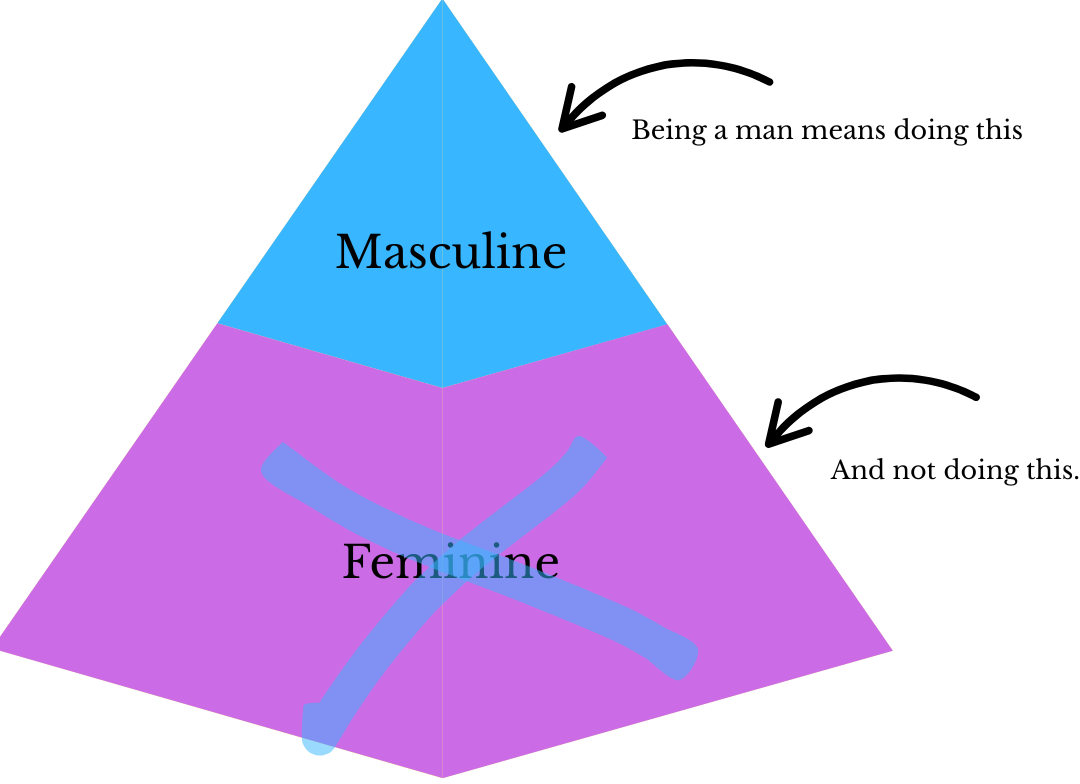I got a warning that this email was too long. It should open in your browser when you get to the end. I looked at cutting it and making it two, but all the places I looked at cutting left too much hanging. So, if you are tight on time, go for the video for a faster listen, or check out the AI podcast at the bottom.
Starting with our Emotions
One of the things they don’t tell you when you become a parent is how lonely it is. Women have realized this and created “Mommy and Me” or “Mother’s Day Out” programs, but almost nothing exists like that for men. So, as a stay-at-home dad, I quickly learned how lonely it is, and being an introvert, I struggled on. What I have since learned is that most men are just as lonely as I am as a stay-at-home dad. For the last few months, I have been considering loneliness in light of the rise of ‘bro-culture.’ Check Wikipedia if you need an explainer.
While considering what bro-culture is and what it isn’t and what’s worth hearing from the men steeped in the culture, like Joe Rogan or Andrew Tate, I read this article from a feminist about how it’s harder to be a man than a woman.
Take a second and let that sink in. A feminist… thinks it's harder to be a man… than a woman.
The almost insane article title caught me off guard. It has since lived rent-free in my head for months. Because if a feminist thinks it's harder to be a man, then it probably is harder to be a man.
Ok, so what does that mean? What do we do with that information?
Well, some probably filed this information away as ammunition for the next fight they are going to have with a woman. Others probably dismissed it out of some sense of misguided chivalry (re: Don Quixote). A few others just threw up their hands and kept going in life. Finally, there’s me.
I have been taking it apart for months, trying to understand what’s going on. My articles from a few weeks ago were about creating space. They began life as an attempt to understand this. After fumbling about for a few months, I have a few ideas that might be worth your attention. So, let’s organize the information, and then ask: what's next?
Pyramids
Ok, let’s check out this pyramid. We have the masculine on top and the feminine on the bottom. And just like the ancient Israelites and Egyptians before the Exodus, we know that those at the bottom serve those at the top. To put it bluntly, men have power over (on top) of women. This pyramid also shows us that all things masculine go on top and all things feminine go on the bottom.
What does that mean?
It means that men can only be men when they do masculine things. Otherwise, they are considered weaker and ‘womanly.’ I use 'weaker' to help us understand that it's not a strength thing, but a power thing. As a man, when I do womanly things, I am perceived as having less power than other men who do masculine things. I am perceived this way by both men and women.
If I have less power, then I do not fit in at the top of the pyramid. If I do not fit in the top of the pyramid, then other men cannot be associated with me, for at least the subconscious fear of seeming weak. If they do associate with me, they must demonstrate to others that they have power over me. This assertion alienates me from all men. It also alienates them from me.
This is the loneliness we, men, experience. It comes from both trying to fit in and also not getting kicked out. We end up either estranged from other men or estranged from ourselves. Either way, we fundamentally deny who we are as a man or a person.
An example
Let me give you an example. I love musicals and always have. Pirates of Penzance (though technically an opera) might be my favorite, but I enjoy anything with a good patter song and most of Disney’s stuff. Liking musicals despite Lin-Manuel Miranda is widely viewed as womanly.
In High School, I was a part of the Baseball Team (we won State my junior year) and the nerdy AP student crowd. Both groups bashed musicals. So I bashed on musicals and we all made fun of the theater nerds (despite my secret desire to join them). To my shame, I have never really gotten over how we treated some of the best artists in the school. They may not have earned any honors or awards, but they put themselves out there. But I denied myself as a person to fit in as a “man.”
Now, an older me cheers on those who love musicals, sports, and nerdy stuff. Since I am already estranged from most men, being a stay-at-home dad, I can be true to myself.
You might think this is my experience, but check out how a Christian pastor sees it (below). And in case you think it’s one weirdo pastor somewhere, I have heard these parroted by the leaders at many churches, too, including mine.
So, how do women come into play?
However, women, especially in our modern context, have access to both halves of the pyramid. They can behave in both masculine and feminine ways. It often behooves them to act masculinely because they rise to the top of the pyramid. And as long as men don’t realize (or care) that a woman is at the top, she can be anywhere she wants.
The hard part is when men feel infringed upon. We quickly tear down a woman with too much power and return her to the bottom half. We (Americans) all experienced this with Donald Trump’s first election. People said a woman can’t lead and have that much power. The reasoning was not her qualifications or abilities, though. The unspoken question is, “If she can be at the top, what does that make us?”
Our subconscious puts up hard barriers against women entering these roles because certain masculine things might be weaker than feminine things. If that’s the case, then where are men on the pyramid? At the bottom. If you are at the bottom, what does it mean to be a man?
That’s the friction that is being generated right now across Western Civilization.
Friction
By cultural definition, if men aren’t at the top of the pyramid, then they aren’t men. At the same time, women are brilliant and capable, and recent studies have even shown less “womanly” in the workplace.
Which only furthers the issue of what is a man?
What is a woman (historical man’s perspective)?
Let’s begin with what is often seen as the inverse. If we can describe a woman, then a man is all the things she is not. This isn’t the greatest way to define womanhood (for many reasons), but it does give us a starting point for understanding how historical context is applied today.
Women are most easily distinguished from men in one thing men cannot do: give birth. Now, it’s possible that somewhere, some scientist could experimentally implant and provide all the necessary things for a man to carry a child to term. But, outside of that extreme situation, men cannot give birth or bring life.
Thus, for the last several thousand years, and especially since the Christian Reformation and Western Enlightenment, we have ultimately interpreted that anything related to giving or bringing life (or maybe nurturing) is the domain of a woman.
Men and Death
If the domain of life is a woman’s domain, then its opposite is a man’s: death.
Now, there are practical reasons for us to assume this domain. As generally larger and stronger humans, men are better equipped to fight or fend off wild animals from the family. So our ties to death connect us to our family by keeping them alive or staving off death.
Well, I don’t know about you, but I have never had to fend off a wild beast from my family. My family lives in the suburbs of a relatively chill city. Life and death are not everyday worries for us. Maybe that makes me privileged, but I also know that over the past decade, we as a species have become capable of feeding every member the required calories for a day. So life and death, even then, aren’t so much an outside uncontrollable threat, but a concern of human cooperation.
But this removal from the immediacy of danger and the realm of death is inherent in civilization. The disconnect between men’s most primal role of fending off death and the civilized man’s lack of purpose has almost always presented a challenge to that very civilization. Eventually, men lose their sense of what it means to be a man in a tribal setting and reassert the power of death. This reassertion is part of the decline of civilization into war.
The return to death isn’t a first choice. It is born from our lack of connection. We fail to connect to other men when we do not have death as a centerpiece. We lack the imagination and skills to communicate in other ways. Why do you think hunting is such an important connection point in our ancient and modern context? We also lose our connection to the family, the most important people in our lives.
One of my goals in this faithful fatherhood Substack is to help you connect with your family through faith. Maybe that means choosing a different faith or doubling down on the excellent and praiseworthy things in your life already (think musicals).
So, how do men fight this loneliness?
Two ancient poems fit this trouble. The lesser-known is the Poem of Erra, and the better known is the Epic of Gilgamesh.
Erra (the fires of war)
In the Poem of Erra, who is the god of mayhem or pestilence or perhaps better summed up as destruction, is called to his senses and wants to wage war on people. He does so when the god of the Babylonian civilization, Marduk, is away. Erra is the no-longer slumbering god of dealing death. He is the image of a man who has lost his way from the domain of dealing death and wants to return.
Look at the current United States administration (2025). They are funded both literally and culturally by men who want to deal death again. The emotional undertones stem from the loneliness and lack of purpose in their lives. When Erra lacks purpose, he deals death. So too do men today, and since ancient Babylon. We derive our purpose from the counter-definition and alienation of women who bring life.
Enkidu (it’s all about sex)
Tablet two of the Epic of Gilgamesh describes the taming or civilizing of the Barbarian Enkidu. Honestly, I'm surprised HBO hasn’t turned this tablet into an entire franchise because it’s all about sex.
After subduing Enkidu, Gilgamesh civilizes him through a goddess or priestess/prostitute/sometimes goddess, Samhat. The truth transmitted to us from this ancient tablet is that if men can’t deal death, then they are going to want to have sex. Sex becomes the focal point of civilization because it is a method for men to connect. Consider the French la petite mort.
For women, sex being the centerpiece might not be the worst (better than war). Consider how rich some OnlyFans stars are right now. It might be better than death. But it also blends into rape. Which violates your entire person, so it might be better if we had just killed her instead of raping her and forcing her to have our children.
Or consider the rise of Porn in our civilization. Sex subdues and “civilizes” men. If men are about to go to war, then the best path to stop it is sex. Sex, through porn, is available 24/7. Is that an overall good thing? Does it help men fight the loneliness? Check in over the next few weeks.
What happens when we do reassert death?
Well, let’s consider what we do with the pyramid once we reach this point, because we've seen it several times in history.
Typically, what we do is we harden the barriers through death or rape, removing most (if not all) women from the top of the pyramid. We saw it several centuries after the unification of Upper and Lower Egypt. We can see this in the collapse of the Roman Empire, the defeat of the Persian Empire by Alexander the Great, and the Crusades. We saw this in response to the revolutions between the 30 Years' War and the Cold War. We see it now in the United States with the election of Donald Trump.
Once the women are pushed out, the top of the pyramid expands as much as possible. This overextension leads to revolutions, defeats, and the collapse of civilizations. The pyramid expands because men are trying to create more space for connecting. It’s all we know. The problem is that the barrier doesn’t let enough (or any) men in. There is more space to be a man, but fewer men in the space.
The disproportion often comes from other men slacking. Instead of being vulnerable or growing in a new direction, we acquiesce our power to someone else. Why? Because we imagine we are not wise enough to use it well (c.f. Plato’s Republic). So we give it to one or a few people, and it’s too much for them, too. Worse, men are still alienated from each other and from being men, except those who lust for power and glory.
So this is not just a man's problem; it is an all-of-us problem because we all experience the same thing regardless of whether men hold the power. The pyramid, like civilization, collapses when the top has too much weight.
So what do we do?
Well, that’s for the next few weeks. Next week, I will introduce the philosopher Epicurus via Lucretius’s De Rerum Natura. I think Epicurus and Lucretius correctly diagnosed this problem in classical Greece and Rome, while offering a unique insight that wouldn’t exist again for nearly 2,000 years. He does so by challenging many of the pillars of Western Civilization described by Plato and his student Aristotle. Consider the axiom primordia et inanis. Or Atoms and Void in Greek άτομα και κενό. For Christians who know their Greek, that’s the same root from which we get 'kenosis'.
What do atoms and void have to do with taking apart our loneliness and spiral to death? Perhaps a lot.
I look forward to seeing you next week. Let me know if you have any questions or comments. I hope you will engage with this. Tell me your stories of loneliness. Tell me when you weren’t allowed into the club. That’s the only way we can imagine a better future together.
I forgot to add this part to the video, but if you’re struggling to understand the big deal, check out this 1.5-minute video. Pardon the French if you have little ears listening.
A.I. Conversation, which I thought was pretty cool.




















Share this post